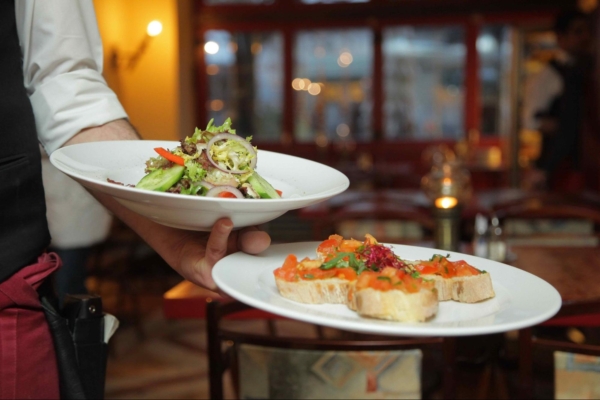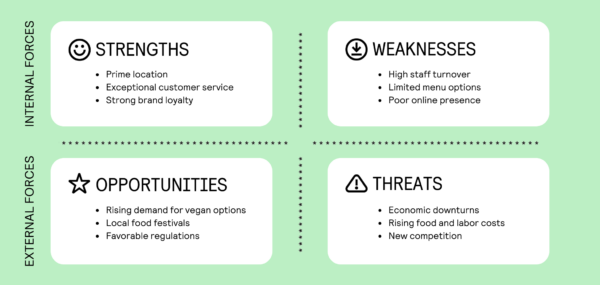The Impact Of Online Reviews On Restaurants: Why They Matter More Than Ever

The last time you tried a new restaurant, what steps did you take before you walked through their doors?
Did you scroll through the online reviews first?
Check the star rating?
Maybe skim a few photos?
Your guests are doing the same thing—Every. Single. Day.
Online reviews have become one of the most influential factors in how consumers choose where to eat, especially for independent restaurants.
It’s not just about good food anymore—it’s about trust, reputation, and visibility.
Whether someone’s deciding where to make a reservation or who gets their lunch order, what others say about you online carries real weight.
In this article, you’ll learn:
- How online reviews shape restaurant discovery and customer decision-making
- Why positive reviews lead to higher revenue and stronger customer loyalty
- How to make them work in your favor, even when the feedback isn’t perfect
Let’s dig into why online reviews matter more than ever—and how they can help your restaurant grow.
To help you get started, we compared the top 6 restaurant review sites to find out which ones have the biggest impact. Check out the video below to see where you should focus.
The Impact of Online Reviews on Restaurants: What it Means for Your Business
Whether you’re paying attention to them or not, your online reviews are affecting your business and your customer trust and loyalty.
They influence dining decisions, impact how and where your restaurant shows up online, and play a huge role in how your brand is perceived by people who haven’t placed an order yet.
Here’s how reviews are shaping your business every day.
Social proof shows you’re legitimate
People trust other people.
In fact, 84% of people trust online reviews as much as personal recommendations.
When diners see dozens—if not hundreds—of strangers vouching for your food, service, and atmosphere, it creates instant credibility in the decision-making process.
It’s not just about the messaging you’ve created on your website or social media—it’s about what others are saying about you, and whether that feedback builds trust before a guest even walks through the door. Effective engagement through responding to reviews and actively listening to customer feedback can enhance your restaurant’s online reputation.
Reviews are a key part of being discovered
Platforms like Google, Yelp, and TripAdvisor don’t just list restaurants—they rank them.
Search engine algorithms factor in both the quantity and quality of online reviews when deciding who gets visibility.
That means your online rating can affect whether your restaurant shows up in local searches at all, or if it gets buried beneath your competition.
Star ratings shape first impressions
A restaurant with 4.5 stars automatically feels more appealing than one with 3.8.
It’s often the first detail people notice, and even a small difference in rating can impact if someone clicks, books, or scrolls past.
A study out of Berkeley found that a half-star improvement on Yelp’s five-star rating scale makes a restaurant 30% to 49% more likely to be fully booked during peak hours. This data highlights the significant impact of online reviews on consumer behavior and restaurant success.
If online reviews play this big of a role in shaping your guests’ decisions, it makes sense to take a more proactive approach to managing and influencing the conversation.
Let’s take a closer look at how positive online restaurant reviews help your restaurant win.
How Positive Restaurant Reviews Drive Success
A steady stream of positive reviews not only makes your restaurant look good—it builds momentum.
When guests consistently leave positive reviews, it signals to future diners that your restaurant delivers, and that kind of reputation grows your repeat customer base. Providing high quality service is crucial in driving customer satisfaction and loyalty, which in turn generates positive reviews.
It also sets the tone for what new customers can expect.
If potential customers see review after review saying you’re doing something right—be it your service, food quality, or overall vibe—it creates a collective public narrative.
And that narrative can lead to opportunities you might not expect.
Local media outlets, food bloggers, and influencers often use review platforms to scout out new places to feature.
A strong online reputation can be the spark that lands you a write-up or feature in a local magazine, “Top 10” list, or a popular social media influencer post, bringing in waves of interest you didn’t pay or plan for.
With that new interest, your visibility will compound quickly—and not just through press outlets. Good online reviews are like word-of-mouth on steroids.
In the old days, a happy customer might tell five friends. Today, a positive Google review could influence 500 strangers in your area.
Every glowing online restaurant review becomes a kind of unpaid endorsement that works 24/7, reaching people you haven’t met yet—and convincing them to give you a try.
When positive reviews start to stack up, they create a flywheel effect: more visibility, more buzz, more momentum.
Of course, not all feedback will be five stars—with 22% of diners saying they’ll avoid a business after reading just a single negative review, it pays to know how to respond well.
The Challenges: Handling Negative Reviews the Right Way
Even the best restaurants get negative online reviews. It’s part of being in the service industry—and it doesn’t always mean you did something wrong.
Sometimes it’s a mismatch of expectations.
Sometimes it’s a bad day.
And sometimes it’s just someone having a moment.
The key thing to remember is that one negative online review doesn’t define your restaurant, but how you respond to it might.
How you respond to negative reviews matters
A thoughtful, professional response can turn an upset critic into a return customer.
The largest part of turning a negative review around is making sure the guest feels heard and understood. Responding to both positive and negative feedback allows restaurants to showcase their commitment to customer satisfaction.
When you take the time to acknowledge the issue, thank them for their feedback, and show you’re listening, it signals maturity and care.
Keep it calm, brief, and human—you’re not just replying to the person who left the negative review; you’re writing something that every future guest will read.
A respectful, empathetic reply can go a long way to building trust with total strangers.
Pay attention to emerging patterns, not just the posts
The real danger isn’t the occasional bad review—it’s ignoring patterns.
If multiple guests point out slow service, confusing menu formatting, or long wait times, it’s worth digging into it.
Maybe your to-go packaging needs updating.
Maybe your host or counter needs more support during the dinner rush.
Monitoring reviews regularly helps you spot these trends early and take action before they turn into bigger issues. Effective data analysis of customer feedback can provide valuable insights into areas needing improvement.
Negative reviews aren’t a threat—they’re an opportunity. They give you a window into the guest experience that you’d never see from behind the counter.
Encouraging More Positive Reviews
You can’t control what people say, but you can influence the kind of experience they have and make it easy for them to share it.
The most reliable way to generate positive reviews is to consistently deliver a great customer experience.
That doesn’t mean being perfect. It means being attentive, thoughtful, and consistent—from your food quality and service to the vibe and condition of your restaurant.
When people feel cared for and appreciated, they’re much more likely to say something good about your restaurant online.
That said, even happy customers sometimes need a little bit of encouragement to give feedback. The trick is to ask at the right time, and in the right way.
A quick mention on the receipt, a friendly reminder from staff, or a follow-up email after an online order can go a long way.
And don’t forget the simple reminders guests will see when interacting with your restaurant. For example, a small sign near the register, a note in a takeout bag, signage in table tents, or a “We’d love your feedback!” link in your social media bio can all prompt happy customers to share their positive experience.
The key is consistency—it’s not about asking everywhere, it’s about asking regularly.
The more natural and regular the ask, the more likely guests are to follow through.
To learn how to encourage more Google reviews, read our article How to Get More Google Restaurant Reviews From Customers.
Using Reviews to Improve and Grow
Buried in your customer reviews and comments are clues about what’s working, what’s not, and what your guests actually care about.
The best feedback is often hiding in plain sight, so, instead of scanning for star ratings, go line-by-line and dig into what people are actually saying.
Are multiple guests complimenting the same dish?
Are they confused about your hours or frustrated with pickup timing?
These comments, even when casual, are valuable signals that can guide effective operational changes.
Patterns matter more than one-off negative reviews. For example, one person saying your dining room music is loud could be a fluke.
Ten people mentioning it over the course of two months? That’s worth looking into.
Treating reviews as intel instead of judgment gives you an edge on spotting trends early and staying ahead of guests’ expectations.
You don’t have to make changes based on every single comment, but paying attention to patterns helps you make meaningful adjustments over time.
And when guests take the time to leave a review—good or bad—it’s an opportunity to keep the conversation going.
We said it before, but it’s worth repeating: the key is consistency.
Potential diners love reading restaurant responses to customer comments—and when done well, even negative reviews can win over new guests, helping you create repeat business that grows your restaurant.
Responses that show your customers you’re paying attention, you care, and are trying to improve will, over time, build goodwill and trust.
Your Next Customer is Reading Your Reviews Right Now
Online reviews have never mattered more, and the restaurants that make managing them a daily part of doing business are the ones that will earn trust, stand out, and grow in the competitive restaurant industry.
Contact ChowNow to learn how Direct Website Ordering and a Branded Mobile App can significantly improve your diner experience, helping you to grow your customer base and get more positive online reviews.
Frequently Asked Questions About Online Reviews for Restaurants
Why are online reviews important for restaurants?
Online reviews are one of the most influential factors in a customer’s decision-making process. They serve as social proof, impact your restaurant’s visibility in local search results, and shape how your brand is perceived before someone ever places an order or visits in person.
How do online reviews affect restaurant visibility on Google and Yelp?
Search engines and review platforms like Google and Yelp use reviews to rank restaurants in search results. Both the quantity and quality of your reviews influence whether your restaurant shows up in local searches or gets buried beneath competitors.
Can positive reviews increase restaurant revenue?
Yes. Studies show that higher star ratings correlate with increased bookings and revenue. Positive reviews help build trust and encourage new diners to visit, leading to more sales and stronger customer loyalty.
What’s the best way to respond to negative restaurant reviews?
Respond promptly with empathy and professionalism. Acknowledge the customer’s concerns, thank them for their feedback, and show that you’re committed to improving. Remember, your reply isn’t just for the reviewer—it’s for every future guest reading your response.
How should restaurants handle fake or unfair reviews?
If a review appears to be fake or malicious, flag it through the appropriate platform (like Google or Yelp). However, always maintain a calm and professional tone if you choose to publicly respond, and provide context when appropriate.
How can I get more positive reviews for my restaurant?
Encourage satisfied customers to leave reviews by asking at the right moment—after a great meal, with a note in a takeout bag, through a follow-up email, or with signage in-store. Make the process easy and consistent without overwhelming the guest.
Should restaurants respond to positive reviews too?
Yes. Responding to positive reviews shows appreciation and reinforces customer loyalty. It also helps build a welcoming and attentive brand image for potential guests reading your reviews.





